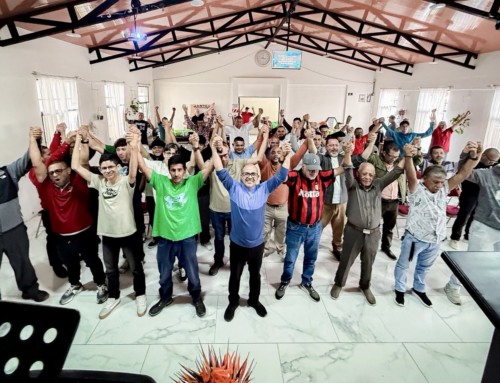Create Safe Places for Questioning
Become a welcoming place for people on a journey back to God.
Kim Hammond and Darren Cronshaw
How can we foster safe places to nurture faith while avoiding inappropriate and unauthentic evangelism? How can we help people understand who Jesus is? As we are being incarnational—that is, being present in a community and practicing proximity with people—how do we proclaim that Christ is Lord?
This is a big challenge for any church, including churches that have made this shift from a consumer mentality to embracing their sentness—the idea that they are sent on God’s mission. Missional churches sometimes have their imagination captured by a broader understanding of mission and get excited about service and justice, but are unsure about evangelism. Some people’s understanding of holistic mission becomes not deed and word (as it should be), but deed and maybe word. We need safe places to offer people compassion and advocate for justice, but we also need places that are safe for people to explore who Jesus is and what that means for us.
We need different ways of talking about the gospel (as well as expressing church) for different sorts of people. Each person’s sharing will be different, and the things we invite people to will be different, because people have different starting point and are at different points in the journey of faith. They may feel God is distant or they may be plagued by guilt; they may long for meaning or be working hard to overachieve or feel their lives are messed up beyond help. They may think they have it all together on their own, thanks very much.
Foster Safe Places
We do not have a 10-step evangelism plan. Maybe it would be nice if we did. Maybe not. But what we do have to share are a few powerful things that we believe help cultivate a spiritual search.
Curious Questions
First, ask curious questions. Rather than speaking about what we believe or want to convince someone of, we start with questions to find out what they believe and what they have already experienced of God. We want to find out where people are coming from and ask questions that provoke their thinking. Let’s plant seeds with questions rather than first giving information.
David Tacey, an associate professor at La Trobe University, researches the growing popularity of diverse spiritualities in Australia. Rather than dismissing this “spiritual revolution” as heretical or superficial, Tacey sees clues to how churches can respond to the cry for spiritual meaning. He challenges churches to be attentive and to listen to how God is communicating with people outside churches. We need to draw it out of people rather than pump it in.
We need to ask questions if we are to function as any kind of spiritual companion. Pastor and author Dan Kimball says he has never been knocked by people when he asks to have a coffee with them for an hour to ask about their impressions about Christianity and the church. Let’s use questions to invite people into conversation about faith and to discover where people are at. We are not seeking arguments, but conversations about what really matters.
We collect good questions to use in different contexts. Here are some of our favorites:
- Where are you on your spiritual journey?
- Do you have a religious background?
- What were your earliest impressions of who God might be?
- What keeps you going when things are tough?
- Has there been a time in your life when you felt God was closest?
- What are some of your biggest issues with Christians today?
- What do you think about prayer and whether it does anything?
- Do you reckon there is any overall meaning and purpose to life?
These ask about important issues. And we have learned not to underestimate people’s interest in spiritual matters and their openness to talk about their perceptions and experiences of God. Many people are hungry for meaning and spirituality; they just do not necessarily look to the church for answers or for space to explore questions.
And when questions are asked back, we do not need to know all the answers ourselves. When we don’t know something, let’s admit it. When we don’t have all the answers, people will be able to relate to that. Rick Richardson, an experienced campus worker and evangelism professor at Wheaton College, comments, “In the past, being an expert and having the answers were what built credibility and a hearing. Today, having the same questions, struggles, and hurts is what builds credibility and gains a hearing.”
At Forge, we like to allow grace and space for mystery, doubt, and theological questioning. It is appropriate to stand for truth but also appropriate to allow space for others to question truth. Some say they left the church because it dismissed their questions or insisted on absolutes in areas that seemed nonessential to them.
New Zealand pastor and sociologist Alan Jamieson studied why people leave evangelical, Pentecostal, and charismatic churches. He relates their journeys to James Fowler’s stages of faith development and says we need leaver-sensitive churches and liminal groups where leavers can explore their questions and emotions safely. This is part of the value of seeing evangelism as a conversation that includes exploring questions and dilemmas, rather than simply communicating doctrinal information.
Stories
It is natural, after asking questions and hearing other people’s opinions and experience, that you share something of your story. The most influential story you can share is your own. Let’s never be embarrassed about this faith aspect of our life. Peter urged the early church, “You must worship Christ as Lord of your life. And if someone asks you about your Christian hope, always be ready to explain it. But do this in a gentle and respectful way” (1 Peter 3:15–16).
Remember the impact your way of life can have. In the recent past, the integrity of the message was primary. We were eager evangelists, memorizing answers to objections about faith to ensure we had the message straight and had logical responses to questions all sorted out. This is not unimportant. But nowadays the integrity of the messenger is primary. People look at the pattern of our lives before the proclamation of our words, so they will more likely grasp truth as we live submerged among them, authentically sharing our stories.
This doesn’t mean we all need spectacular testimonies. Where have we experienced God for ourselves? Where are we growing in our faith? Where have we struggled and come through with the help of Jesus? Sri Lankan evangelist Ajith Fernando warns, “Christians who do not know the joys of lingering in the presence of God will be at a loss to know how to respond when people speak of serenity through New Age disciplines like transcendental meditation.
What is an experience of God that you can authentically share? What is it that captured your imagination about what really is good news about Jesus? What has Jesus done for and in you? Your story and experience of God is worth sharing. And your friends, even when they have a different background, will likely be interested in your faith as part of who you are. Don’t undersell it. In sharing your story and experience of God, rather than just ideas or beliefs about God, you are more likely to encourage people in their own spiritual search. Let your story invite people toward experiences of God, not just ideas about God.
Don’t underestimate how interested people are in experiencing God. A Christian student was witnessing on a secular university campus to a New Age friend. The Christian girl had gone through her arsenal of Christian apologetics without sensing any breakthrough. They were about to part when the Christian said, “Before you go, can I pray for you?” She began to pray and was surprised to find the New Age girl crying. “I just can’t believe you’re speaking to God!” she said. Your experience of God will speak volumes.
Centered-Set Communities
Consumer culture thinks in mass terms—we are not diverse people congregated together but categories of people organized in homogenous units. Historically, this has led to in-groups and out-groups, with those who don’t fit the dominant category marginalized and neglected. A culture organized around incarnational mission looks at the world differently: the place of comfort is a place to search for new friends, to pursue those who have been dismissed as beyond the reach of a loving God.
Groups invite people to belong based on different criteria, called bounded sets or centered sets. Bounded-set groups use clear boundaries. People are “in” or “out” depending on their beliefs and behavior, on being on a membership roll, or on whether they hold a commitment to a specific ideology. In contrast, centered sets don’t define people as in or out but measure their proximity to a defined center: a Christian, for example, under a centered-set perspective is someone who has made Jesus the center of his or her life and is growing in Jesus’ direction. Frost and Hirsch illustrate the difference by talking about wells and fences. Some farmers build fences around their properties to keep their livestock in and others’ livestock out (a bounded set). But remote farmers don’t waste time with fences. They dig a well, knowing cattle will stay close to the water supply (a centered set).
Centered-set evangelism seeks to tantalize not-yet Christians into a process of searching and encourages everyone to grow in faith and Christlikeness. It assumes the Spirit is drawing all people to God and that we all long to know the reason for our existence. All are welcomed into relationship with a missionary people, and all who have experienced the shift are encouraged to support and encourage one another as they seek shalom with those outside the gates of acceptability. This space making often results not in a homogenous community, but a fellowship of freaks—an eclectic group captivated by and centered on Jesus.
Churches as centered-set safe places are not concerned with artificial boundaries and adopting cultural habits, but recognize that Christ the living water is so precious that people will want to center their lives on him. We love interactive and participatory worship, and when we lead and preach we tend not to dominate the microphone. We like to invite anyone and everyone to participate in worship to whatever extent they like. Some people may simply sit and listen; others are keen to share about their journey and experience. We try to cultivate church life as a context that is safe for people to share from their heart, including people with different perspectives and people who are still on a journey toward faith.
This is contentious in some circles, including some churches that are only starting to embrace their sentness. They sometimes get nervous when people outside traditional boundaries are permitted to contribute in church. We have heard of parent churches that try to stop new experimental church plants from letting people who are not Christians lead singing or participate in other ways. An open mic is dangerous to the status quo, our friends have found.
We are less concerned with whether people believe the “right” things or behave in the “right” way before they participate and more concerned that we are welcoming them in the right way and helping guide them to explore in Jesus’ direction. We are inspired to make the well available, and if people want to taste and take a drink and to talk about how they are finding the journey, we give them a microphone. We expect to learn something along the way as well as help others in their journey.
People are after a loving, genuine community, not just ideas about God. People long for love and for a safe place to belong. That is an apologetic that will win Hindus in India, Muslims in Iran, agnostics in Europe, secularists in Australia, and lapsed believers in America. Our world needs churches prepared to offer safe places to people in need of refuge.
—Taken from Sentness by Kim Hammond and Darren Cronshaw. Copyright 2014 by Kim Hammond and Darren Cronshaw. Used by permission of InterVarsity Press, P.O. Box 1400, Downers Grove, IL 60515-1426






